Nuclear Testing Victims Speak Out: 'I Have Poison in My Blood'
NYT Opinion
The New York Times
It’s possible that I shall make an ass of myself. But in that case one can always get out of it with a little dialectic. I have, of course, so worded my proposition as to be right either way (K.Marx, Letter to F.Engels on the Indian Mutiny)
Nuclear Testing Victims Speak Out: 'I Have Poison in My Blood'
NYT Opinion
The New York Times
The risk of nuclear warfare is currently at its highest point in decades, becoming a more complex one involving more countries and more technologies.
According to Matthew Bunn, a professor of energy, national security and foreign policy in Harvard, we are at a time when leading experts who were key to preventing nuclear conflicts are "aging out". He pleads that leaders should urgently ask for the help of a new generation of scientists and engineers.
Bunn refers to a worldwide landscape that is marked by increasing nuclear tensions. These include China's construction of missile silos, Russia's nuclear threats in the Ukraine conflict, North Korea's missile testing, Iran's nuclear ambitions, and the current nuclear rivalry between India and Pakistan.
In response to these events, policymakers in the US consider a potential nuclear arms buildup. Military balances are also destabilized by advancements in technologies such as artificial intelligence and hypersonic missiles.
In his paper "Reducing nuclear dangers," Bunn reported that "dark clouds lay on the nuclear horizon, with threats from all directions." He warned that the 2010 New START Treaty is the last remaining agreement that limits the nuclear forces of the US and Russia. However, this treaty will expire in 2026, with Russia blocking the required inspection and without new talks underway.
As of 2024, there are over 12,000 nuclear weapons around the world. According to the Federation of American Scientists, the US has about 5,100 warheads, Russia has around 5,580, China has 500, the UK has 225, and France has 290. Meanwhile, India and Pakistan each have about 170 warheads, North Korea has 50 and Israel has 90.
Becky Alexis-Martin, a lecturer in Peace Studies and International Development at the University of Bradford in the U.K., agrees that we are currently in a time of nuclear tension. He believes that there is a real risk of nuclear war as long as humanity has nuclear weapons.
The risk of nuclear war has not been so high since the Cuban Missile Crisis of October 1962. It was a direct and dangerous confrontation between the US and the Soviet Union during the Cold War and was considered the moment when these two superpowers came closest to a nuclear war.
READ ALSO: Nuclear Weapon Innovator Demands Public Attention for Possible Impact of Nuclear War
Historically, arms control agreements were facilitated by non-governmental conversations among scientists and engineers. According to Bunn, the initial steps should focus on reducing US tensions with Russia, China, and North Korea, as well as establishing communication and risk reduction policies
Bunn believes that there should be in-depth technical dialogues in the scientific community to address issues such as the reduction of conflict in outer space and cyberspace. World leaders should also discuss how new technologies like artificial intelligence and commercial space systems can verify the next generation of arms restraints.
Bunn suggests that the US, Russia, and China should think of ways to reduce hostility, build predictability, and prevent the perils and costs of unrestrained competition. These parties should end their dependence on "launch on warning" policies and take their missiles off alert. This way, decisions on life or death for millions of people will not be made in a matter of minutes.
 |
| ONE OF THESE MEN IS NUKELESS |
Putin's nuclear warning: A Canadian expert
explains the threat level
Genevieve Beauchemin
CTV National News Quebec Bureau Chief
Updated March 14, 2024
At the height of the Cold War, a statement like Russian President Vladimir Putin's warning to the West that his country is militarily and technically ready to deploy its nuclear arsenal(opens in a new tab) would have shaken the world to its core.
UK Arms companies warned they could face prosecution if they continue selling arms to Israel
London, 20th June 2024- Letters have been sent by four organisations to the directors of UK arms companies warning them they could face criminal liability if they continue selling military equipment to Israel.
Global Legal Action Network (GLAN), War on Want, Campaign Against Arms Trade (CAAT) and the International Centre of Justice for Palestinians (ICJP) signed the letter that gives the companies notice of potential criminal liability for atrocity crimes currently taking place in Gaza. These letters are addressed to directors of twenty arms companies, whose UK operations are known to contribute to the F-35 Lightning II fighter jet programme; the F-35 has been heavily used by Israel in its current assault on Gaza.
The letter sets out in detail the legal frameworks governing the provision of material assistance to a party accused of war crimes, supported by reference to extensive evidence of the grave violations of international law that Israel has committed in Gaza. The legal frameworks which expose these directors to criminal liability include the provisions of the Rome Statute (1998), incorporated into UK domestic law through the International Criminal Court Act (2001), under which unequivocal criminal consequences exist for complicity in such war crimes and crimes against humanity.
GLAN and Al-Haq are already taking legal action against the UK government over its refusal to suspend arms exports to Israel despite overwhelming evidence that it is violating international humanitarian law in its onslaught in Gaza. However, as the letter points out, it’s not only the government that could face legal action as companies themselves also have a legal duty to comply with international law.
UK rules demand that where there is a clear risk weapons could be used in unlawful attacks exports must be stopped. Israel has so far killed over 15,000 children, with potential use of British made weapons; these letters make it clear that we will be pursuing criminal accountability for companies complicit in the ongoing atrocity crimes in Gaza.
GLAN Senior lawyer, Dearbhla Minogue said, “Individuals transferring weapons to Israel are exposed to criminal liability, plain and simple. The fact that they are hiding behind a licensing system which is unfit for purpose will not protect them if and when they face a jury of their peers, because ordinary people can see through politicians’ obfuscation.”
War on Want’s Senior Campaigner, Neil Sammonds, said, “There is nowhere to hide for a company director choosing to provide weaponry to a state whose leaders have made clear their intent not to comply with international law and whose armed forces commit atrocity after atrocity. There was already apartheid, forced transfer and collective punishment. Now there is starvation, extermination and plausible genocide. The directors have enabled and profited from this. They are complicit and must be held accountable.”
CAAT’s Media Coordinator Emily Apple said, “The arms companies targeted with these letters are complicit in genocide and are profiting from the horrific war crimes Israel is committing in Gaza. As this letter makes it clear, they cannot hide behind the government’s woeful response, and there will be consequences if they fail to take action”.
ENDS
Notes to editors:
A copy of the letter is available on request. Spokespeople are available from GLAN, CAAT and ICJP for further comment.
Campaign Against Arms Trade (CAAT) is a UK-based organisation working to end the international arms trade. The arms business has a devastating impact on human rights and security, and damages economic development. In seeking to end the arms trade, CAAT’s priorities are to stop the procurement or export of arms where they might exacerbate conflict or support an oppressive regime, and to promote progressive demilitarisation within arms-producing countries. caat.org.uk Contact: Emily Apple emily@caat.org.uk.
Global Legal Action Network (GLAN) is a U.K.-based legal non-profit organisation with offices in the U.K. and Ireland. GLAN works with affected communities to pursue innovative legal actions across borders to challenge powerful actors involved in human rights violations and systemic injustice. glanlaw.org Contact: Abbi Casey acasey@glanlaw.org .
The International Centre of Justice for Palestinians (ICJP) is an independent organisation of lawyers, politicians and academics who support the rights of Palestinians and aim to protect their rights through the law. The ICJP’s principal objective is to coordinate and support legal work which supports the rights of Palestinians in Israel, the Occupied Palestinian Territories and the wider diaspora. icjpalestine.com Contact: Jonathan Purcell jonathan@icjpalestine.com.
War on Want is a charitable membership organisation of people who are committed to social justice. Our vision is a world free from poverty and oppression, based on social justice, equality and human rights for all. War on Want works in partnership with grassroots social movements, trade unions and workers’ organisations to empower people to fight for their rights. We run hard-hitting popular campaigns against the root causes of poverty and human rights violations.www.waronwant.org.
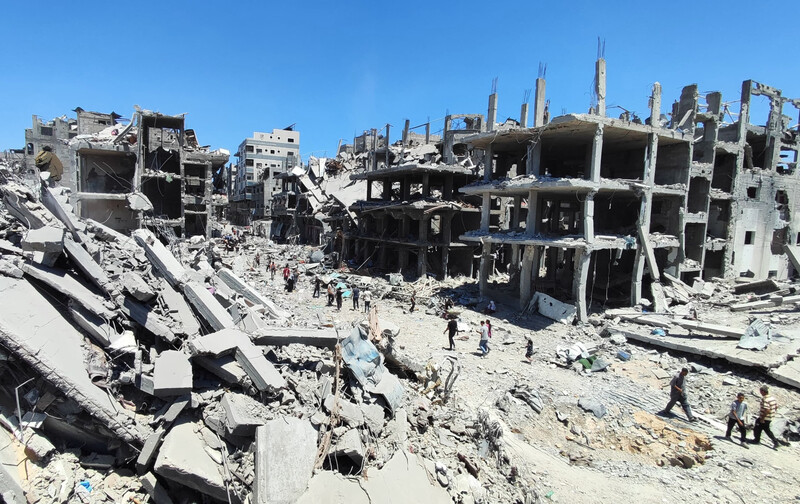
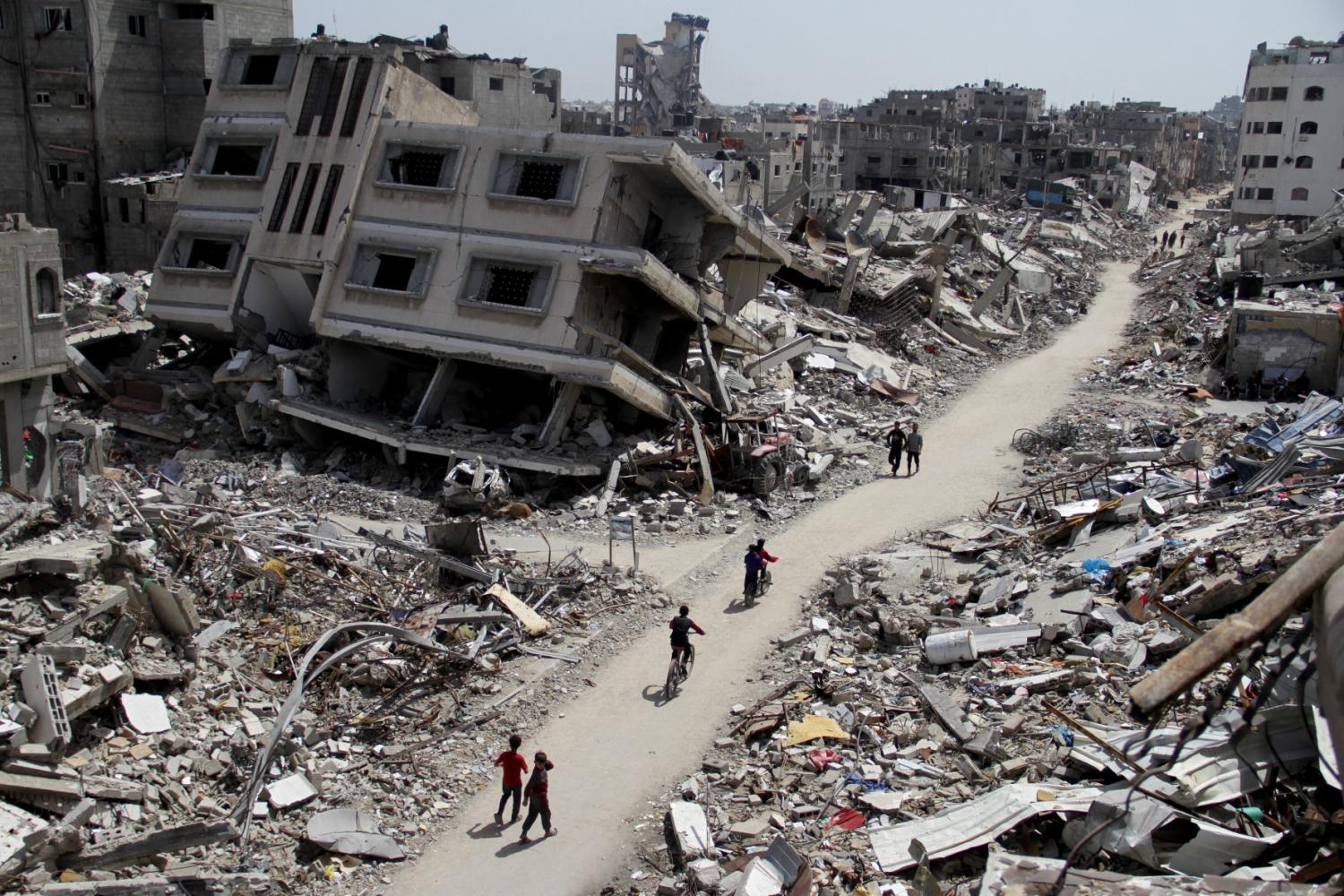

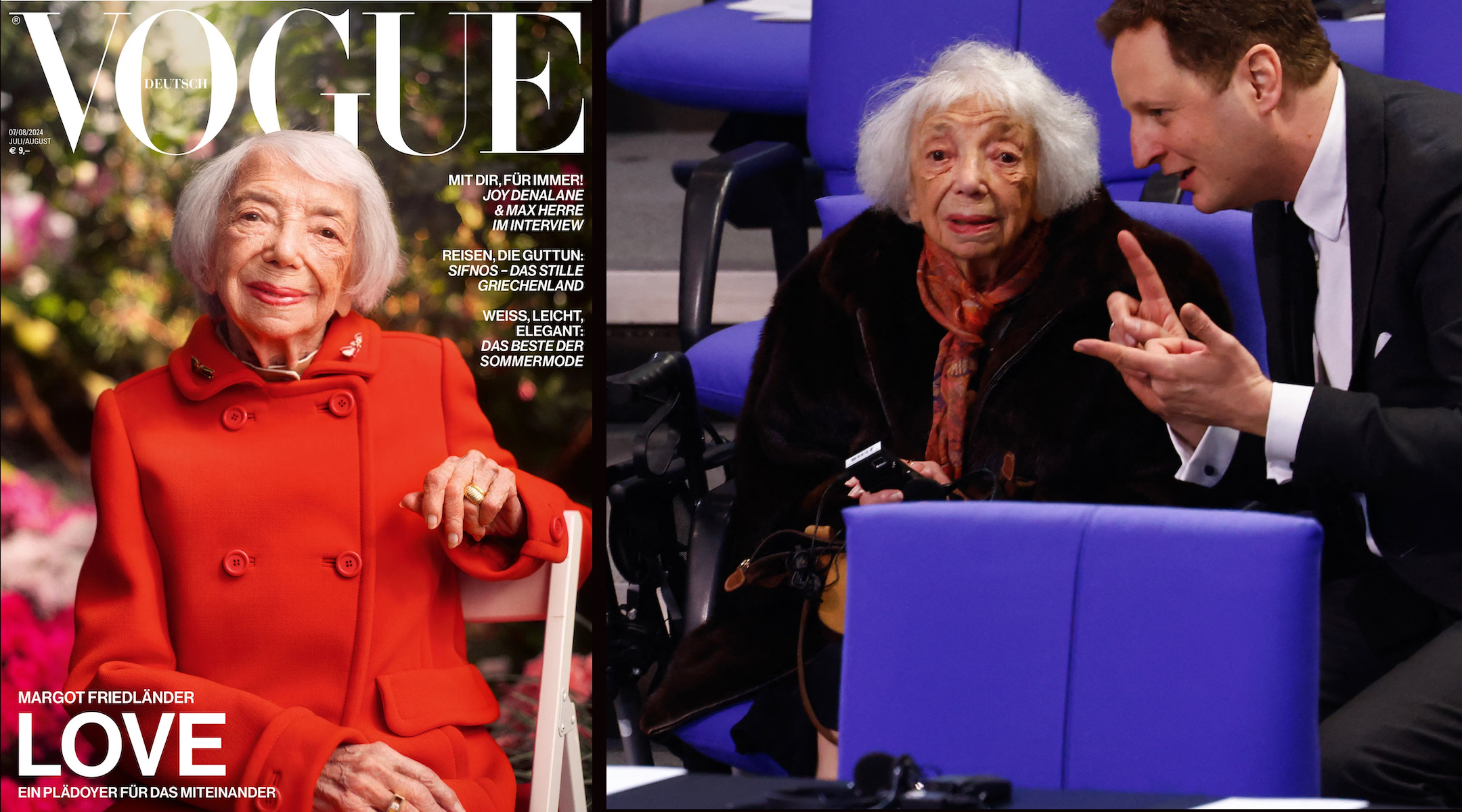
For its latest cover model, Vogue Germany selected a celebrity who regularly hobnobs with visiting dignitaries and walks the red carpet at film premieres: Margot Friedländer, 102, one of the oldest and most prominent Holocaust survivors in the world.
In addition to documenting Friedländer impeccable attire and indefatigable spirit, the Vogue article includes her public condemnation of the rise of the political far right in Germany.
About the rise of the far-right Alternative for Germany party, known as AfD, and the spike in antisemitic incidents amid the Israel-Hamas War, Friedländer told the magazine, “I am appalled.”
Friedländer was born and raised in Berlin and hid there after the Nazis rose to power and began deporting and murdering Jews. She was apprehended in April 1944 and sent to the Theresienstadt concentration camp, where she remained until its liberation a year later. Her entire family had been murdered.
Friedländer and her husband, whom she met in Theresienstadt, moved to New York City, where they lived an unassuming life in Queens. But after her husband’s death in 1997, she began writing about her Holocaust experience, ultimately catching the eye of a filmmaker who brought her to Germany over the course of making a documentary about her.
The trip — which Friedländer had once sworn never to make — changed her life. She moved back permanently in 2010, at age 89, and quickly became a local celebrity, according to a Forward profile that appeared three years after her arrival. She has made hundreds if not thousands of appearances where she tells her story, and increasingly has taken center stage in a country haunted by its Holocaust history.
Last year, she met with Second Gentleman Doug Emhoff during his visit to Berlin. She also presented a prize to Guy Nattiv and Helen Mirren, the director and star of “Golda,” the biopic about Israeli Prime Minister Golda Meir. Recently, according to the Vogue article, “she was invited to a member of the Bundestag’s party at Soho House and celebrated until the lights came back on.”
The Vogue reporter, Miriam Amro, met with Friedländer four times over several months, and a photographer took glamor shots of her in luxury clothing at the Botanical Garden of the Free University of Berlin.
“Margot Friedländer seems to become more energetic each time,” Amro writes about their conversations. “As if her mind were following a reversed time calculation. Every word she says is full of positive power. A woman who has experienced the worst speaks without being bitter. How is that possible?”



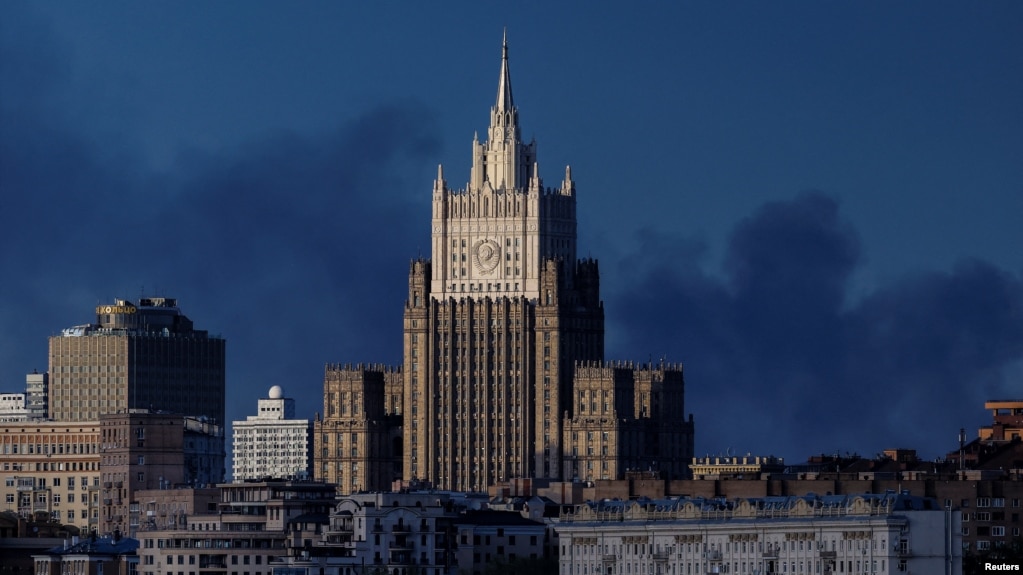


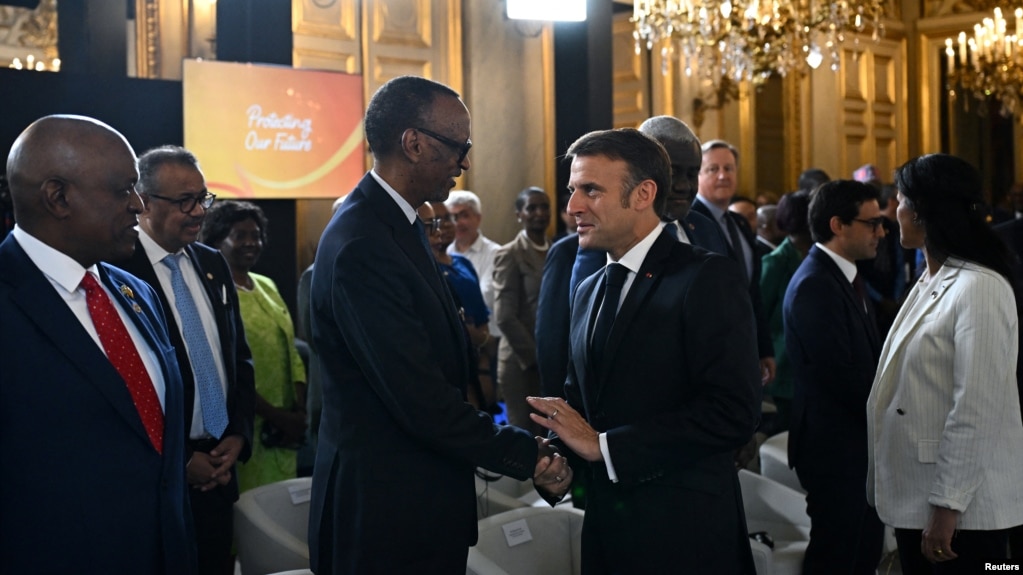


WHITE SUPREMACY KILLS
Addressing Climate Change Means Combatting Structural Racism

The United States is currently experiencing a heat dome, with temperatures soaring to 122 degrees Fahrenheit (50 degrees Celsius) in some western states and remaining high overnight. Heat domes are high-pressure systems of extreme heat that will become increasingly common and more severe as the global climate crisis accelerates.
Nearly 31 million people live under the current US heat dome. While everyone is at risk of heat-related illness and death, people with disabilities, older people, pregnant people, people living in poverty, and people spending more time outdoors, such as people experiencing homelessness and migrant workers vulnerable to rights-violating work environments, are particularly at risk. Heat waves remain the deadliest climate-related weather pattern in the US.
Intersecting with these at-risk groups, people of color are also more likely to live in areas most affected by extreme temperatures. Systemic racism already results in unequal harm to low-income communities of color, and generations of housing and city planning discrimination have led to these communities, in nearly every major US city, living in neighborhoods that disproportionality trap and exacerbate heat.
Structural inequities create circumstances in which low-income communities of color have less ability to mitigate the impacts of heat waves and cool off. Low-income communities have disproportionately less tree cover and shade and less access to air conditioning and the ability to use it, in part because of utility costs. Systemic racism has left communities of color with inequitable healthcare access and heightened rates of diseases that also increase risk of heat-related harm.
Federal, state, and local governments can adopt immediate responses to address these inequities. For instance, the Federal Emergency Management Agency should classify extreme heat and wildfire smoke as “major disasters,” which would make federal funds available to respond to heat waves, including by providing cooling facilities, water, and generators for air conditioning.
It's also critical to mitigate the severity of future heat domes by confronting use of fossil fuels. Fossil fuels are the primary driver of the climate crisis and the source of extensive human rights harms, which are disproportionately borne by communities of color. State and local governments should hold the fossil fuel industry accountable by requiring companies to pay for climate-related damage, as Vermont has recently done and Multnomah County is attempting in Oregon.
To uphold their human rights obligations and mitigate harm from extreme heat, governments need to rapidly phase out fossil fuels and work to remedy structural inequity.